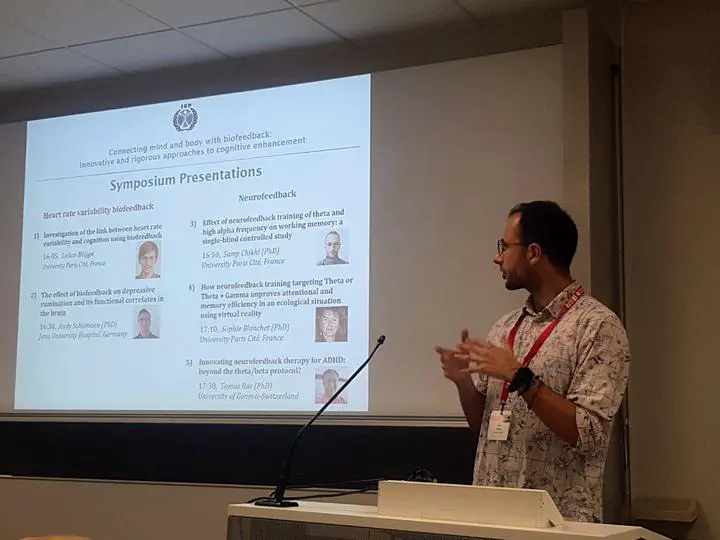Symposium: Connecting mind and body with biofeedback: innovative and rigorous approaches to cognitive enhancement

Abstract
Biofeedback is a training technique based on the self-regulation of physiological parameters provided by real-time feedback. This technique has seen a resurgence of interest in recent years as a method of cognitive enhancement, therapy and as a tool to study the relationship between mental and physiological activity. In this context, we will demonstrate novel psychophysiological findings derived from innovative methods and the use of biofeedback applications (i.e., neurofeedback, heart rate variability [HRV] biofeedback). Out of five presentations of this symposium, two will focus on clinical populations (patients with depression or attention-deficit hyperactivity disorder [ADHD]) and three on healthy participants. 1) Bögge and colleagues will present two pioneering studies conducted with healthy participants investigating the impact of HRV biofeedback on cognitive control and memory and its ties with HRV. In study 1, they demonstrate persistent effects of HRV modulation on cognitive performance using a newly developed virtual reality-based biofeedback device. In study 2, HRV biofeedback was coupled with a false memory paradigm to explore the effect of HRV stimulation during subsequent cognitive processing on cognitive control over memory. 2) Schumann and colleagues will present fMRI data from depressed patients to study the impact of HRV biofeedback on brain functional connectivity with a particular focus on rumination. 3) Chikhi and colleagues will present a study investigating the effect of a single neurofeedback training session of theta or high alpha frequency on working memory compared to an active control condition using random frequency amplitudes. They also investigated psychological, cognitive, and electrophysiological factors that can predict neuromodulation. Despite that no specific behavioral gains were observed, they found that the resting amplitude of trained frequencies predicted the amplitude increase during training. 4) Blanchet and colleagues trained theta or both theta and gamma frequencies in young and healthy adult during five weeks. They showed that targeting both theta and gamma frequencies enhances recollection of temporal contextual information and attention during an ecological episodic memory task implemented in virtual reality. These innovative and original results contribute to the development of a rigorous investigation of the modulation of neurophysiological activity by biofeedback. Finally, 5) Ros and colleagues will present the application of a new analytical framework to identify the neural correlates of ADHD called EEG microstates. The authors show the feasibility of converting these novel EEG biomarkers into neurofeedback regulated signals to provide more spatiotemporally specialized training, impacting behavioral measures of impulsivity and inattention among patients with ADHD.